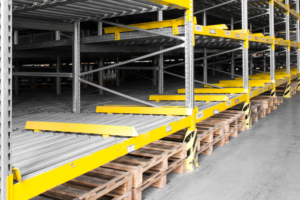Peak seasons are periods of heightened demand that require careful planning and resource management to ensure efficient operations.
In these times, seasonal planning must be done so that you can prepare for increased demand and manage inventories effectively.
If you want to learn more about the importance of seasonal planning in logistics, scroll down.
Why Is Seasonal Planning Important in Logistics?
Seasonal planning helps you capitalize on peak season opportunities while maintaining reliable service throughout the year.
Below is a detailed breakdown of the reasons why you should do it.

1. Seasonal Planning Prevents Stockouts or Overstock Situations
Seasonal planning helps prevent situations where you either run out of stock or hold excess inventory, both of which have serious financial implications.
Stockouts can lead to missed sales opportunities and potential loss of customers, as they may turn to competitors if their preferred items are unavailable.
Conversely, overstock results in increased storage costs, the risk of inventory becoming obsolete, and the potential for product markdowns, which can erode profits.
Anticipate demand patterns based on historical data, market trends, and upcoming events so that you can adjust inventory levels accurately.
This minimizes holding costs and ensures that products are readily available when customers need them.
2. If You Inform Your Suppliers About the Possible Increase in Order Volumes, You Can Avoid Bottlenecks
If suppliers are aware of a potential increase in order volumes, they can better prepare to meet the demand by adjusting their production schedules and more.
This reduces the likelihood of bottlenecks, which are situations where delays in the supply chain hold up production or delivery.
Without planning, they may struggle to fulfill orders on time during peak seasons, leading to delays that impact the entire supply chain.

3. You Can Ensure Compliance with Seasonal Regulations and Restrictions to Avoid Penalties and Disruptions
Many industries are subject to seasonal regulations and restrictions, which vary by region and market.
Stay updated on regulations that affect your operations so that you can take proactive steps.
This compliance minimizes risks associated with legal issues and helps maintain smooth and lawful operations during seasonal peaks.
4. Proper Planning Helps You Identify Potential Risks and Develop Contingency Plans to Handle Disruptions
The logistics industry faces various risks, including supply chain disruptions, labor shortages, extreme weather events, and transportation delays.
Seasonal planning includes a thorough assessment of these risks, enabling you to develop contingency plans that prepare you for unforeseen challenges.
For instance, if a peak season falls during a time of year prone to bad weather, you may consider arranging alternative routes or securing backup carriers.
5. You Can Manage Increased Workloads to Avoid Burnout
Seasonal peaks often mean increased workloads for employees involved in logistics, including warehouse staff, delivery drivers, and customer service teams.
You must prepare for this surge by hiring temporary workers, offering overtime opportunities, or redistributing workloads among team members.
This prevents burnout, which can occur when employees are overworked and stressed.
Burnout not only affects employee well-being but can also lead to higher turnover rates, reduced productivity, and lower quality of service.

6. You Can Secure Transportation Capacity to Meet Higher Shipping Demands and Avoid Delays
During peak seasons, the demand for transportation services increases significantly as you rush to meet consumer demand.
By planning ahead, you can secure the necessary transportation resources well in advance, ensuring you can handle higher shipping volumes.
This could involve negotiating contracts with carriers, arranging additional vehicles, or collaborating with third-party logistics providers.
7. Timely Delivery of Products During Peak Seasons Enhances Customer Satisfaction and Loyalty
One of the key benefits of seasonal planning in logistics is the ability to meet customer expectations for timely deliveries, particularly during peak seasons.
When customers receive their products on time and in good condition, it enhances their satisfaction, fosters loyalty, and encourages repeat purchases.
You not only meet immediate customer needs but also build trust and long-term relationships that contribute to sustained success.

Conclusion
With seasonal planning, you can manage increased workloads, secure transportation, and deliver products on time, all of which enhance customer satisfaction and loyalty.
These preparations help you maximize profitability during high-demand periods while ensuring a resilient, responsive supply chain that can meet customers’ needs year-round.
If you need a steady supply of pallets for the upcoming peak season, check out our pallet products here.
Chesapeake Pallets has been helping companies across the United States level up their logistics, one pallet at a time.
For inquiries, email info@chesapeakepallets.com or request a quote below!
















